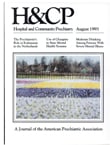Three Phases of Clozapine Treatment and Phase-Specific Issues for Patients and Families
Abstract
Based on the authors' experience with more than 40 patients with treatment-refractory schizophrenia, they describe three phases of clozapine treatment. Phase-speufic responses of patients and their families during clozapine trials often resemble their reactions during adaptation to chronic schizophrenia. Because the effectiveness of clozapine treatment has been so widely reported, many reactions are based on families' cure and rescue fantasies that resurface and intensify after having previously been worked through. Extreme, paradoxical, and problematic reactions, such as conflicts arising from patients' improved functioning, can threaten the viability of the clozapine trial and must be carefully managed by the therapist. The authors recommend specific treatment approaches for the different phases of the clozapine trial, including family therapy and psychoeducation throughout the trial and an approach based on object relations during the final phase.
Access content
To read the fulltext, please use one of the options below to sign in or purchase access.- Personal login
- Institutional Login
- Sign in via OpenAthens
- Register for access
-
Please login/register if you wish to pair your device and check access availability.
Not a subscriber?
PsychiatryOnline subscription options offer access to the DSM-5 library, books, journals, CME, and patient resources. This all-in-one virtual library provides psychiatrists and mental health professionals with key resources for diagnosis, treatment, research, and professional development.
Need more help? PsychiatryOnline Customer Service may be reached by emailing [email protected] or by calling 800-368-5777 (in the U.S.) or 703-907-7322 (outside the U.S.).



